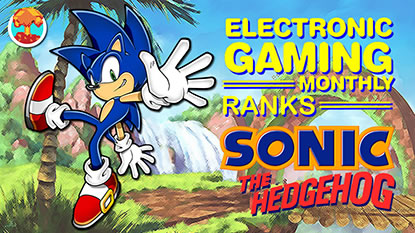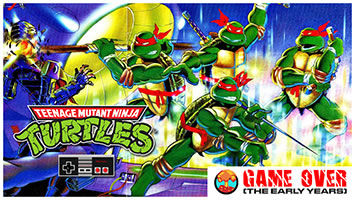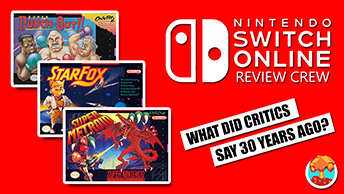- CLASSIC MAGAZINES
- REVIEW CREW
A show recapping what critics thought back
when classic games first came out! - NEXT GENERATION'S BEST & WORST
From the worst 1-star reviews to the best
5-stars can offer, this is Next Generation! - NINTENDO POWER (ARCHIVE)
Experience a variety of shows looking at the
often baffling history of Nintendo Power! - MAGAZINE RETROSPECTIVE
We're looking at the absolutely true history of
some of the most iconic game magazines ever! - SUPER PLAY'S TOP 600
The longest and most ambitious Super NES
countdown on the internet! - THEY SAID WHAT?
Debunking predictions and gossip found
in classic video game magazines! - NEXT GENERATION UNCOVERED
Cyril is back in this spin-off series, featuring the
cover critic review the art of Next Generation! - HARDCORE GAMER MAGAZING (PDF ISSUES)
Download all 36 issues of Hardcore Gamer
Magazine and relive the fun in PDF form!
- REVIEW CREW
- ELECTRONIC GAMING MONTHLY
- ELECTRONIC GAMING MONTHLY RANKS
From Mario to Sonic to Street Fighter, EGM
ranks classic game franchises and consoles! - ELECTRONIC GAMING MONTHLY BEST & WORST
Counting down EGM’s best and worst reviews
going year by year, from 1989 – 2009! - ELECTRONIC GAMING BEST & WORST AWARDS
11-part video series chronicling the ups and
downs of EGM’s Best & Worst Awards!
- ELECTRONIC GAMING MONTHLY RANKS
- GAME HISTORY
- GAME OVER: STORY BREAKDOWNS
Long-running series breaking down game
stories and analyzing their endings! - A BRIEF HISTORY OF GAMING w/ [NAME HERE]
Real history presented in a fun and pithy
format from a variety of game historians! - THE BLACK SHEEP
A series looking back at the black sheep
entries in popular game franchises! - INSTANT EXPERT
Everything you could possibly want to know
about a wide variety of gaming topics! - FREEZE FRAME
When something familiar happens in the games
industry, we're there to take a picture! - I'VE GOT YOUR NUMBER
Learn real video game history through a series
of number-themed episodes, starting at zero! - GREAT MOMENTS IN BAD ACTING
A joyous celebration of some of gaming's
absolute worst voice acting!
- GAME OVER: STORY BREAKDOWNS
- POPULAR SHOWS
- DG NEWS w/ LORNE RISELEY
Newsman Lorne Riseley hosts a regular
series looking at the hottest gaming news! - REVIEW REWIND
Cyril replays a game he reviewed 10+ years
ago to see if he got it right or wrong! - ON-RUNNING FEUDS
Defunct Games' longest-running show, with
editorials, observations and other fun oddities! - DEFUNCT GAMES QUIZ (ARCHIVE)
From online quizzes to game shows, we're
putting your video game knowledge to the test!- QUIZ: ONLINE PASS
Take a weekly quiz to see how well you know
the news and current gaming events! - QUIZ: KNOW THE GAME
One-on-one quiz show where contestants
find out if they actually know classic games! - QUIZ: THE LEADERBOARD
Can you guess the game based on the classic
review? Find out with The Leaderboard!
- QUIZ: ONLINE PASS
- DEFUNCT GAMES VS.
Cyril and the Defunct Games staff isn't afraid
to choose their favorite games and more! - CYRIL READS WORLDS OF POWER
Defunct Games recreates classic game
novelizations through the audio book format!
- DG NEWS w/ LORNE RISELEY
- COMEDY
- GAME EXPECTANCY
How long will your favorite hero live? We crunch
the numbers in this series about dying! - VIDEO GAME ADVICE
Famous game characters answer real personal
advice questions with a humorous slant! - FAKE GAMES: GUERILLA SCRAPBOOK
A long-running series about fake games and
the people who love them (covers included)! - WORST GAME EVER
A contest that attempts to create the worst
video game ever made, complete with covers! - LEVEL 1 STORIES
Literature based on the first stages of some
of your favorite classic video games! - THE COVER CRITIC
One of Defunct Games' earliest shows, Cover
Critic digs up some of the worst box art ever! - COMMERCIAL BREAK
Take a trip through some of the best and
worst video game advertisements of all time! - COMIC BOOK MODS
You've never seen comics like this before.
A curious mix of rewritten video game comics!
- GAME EXPECTANCY
- SERIES ARCHIVE
- NINTENDO SWITCH ONLINE ARCHIVE
A regularly-updated list of every Nintendo
Switch Online release, plus links to review! - PLAYSTATION PLUS CLASSIC ARCHIVE
A comprehensive list of every PlayStation
Plus classic release, including links! - RETRO-BIT PUBLISHING ARCHIVE
A regularly-updated list of every Retro-Bit
game released! - REVIEW MARATHONS w/ ADAM WALLACE
Join critic Adam Wallace as he takes us on a
classic review marathon with different themes!- DEFUNCT GAMES GOLF CLUB
Adam Wallace takes to the links to slice his way
through 72 classic golf game reviews! - 007 IN PIXELS
Adam Wallace takes on the world's greatest spy
as he reviews 15 weeks of James Bond games! - A SALUTE TO VAMPIRES
Adam Wallace is sinking his teeth into a series
covering Castlevania, BloodRayne and more! - CAPCOM'S CURSE
Adam Wallace is celebrating 13 days of Halloween
with a line-up of Capcom's scariest games! - THE FALL OF SUPERMAN
Adam Wallace is a man of steel for playing
some of the absolute worst Superman games! - THE 31 GAMES OF HALLOWEEN
Adam Wallace spends every day of October afraid
as he reviews some of the scariest games ever! - 12 WEEKS OF STAR TREK
Adam Wallace boldly goes where no critic has
gone before in this Star Trek marathon!
- DEFUNCT GAMES GOLF CLUB
- DAYS OF CHRISTMAS (ARCHIVE)
Annual holiday series with themed-episodes
that date all the way back to 2001!- 2015: 30 Ridiculous Retro Rumors
- 2014: 29 Magazines of Christmas
- 2013: 29 Questionable Power-Ups of Christmas
- 2012: 34 Theme Songs of Christmas
- 2011: 32 Game Endings of Christmas
- 2010: 31 Bonus Levels of Christmas
- 2009: 30 Genres of Christmas
- 2008: 29 Controls of Christmas
- 2007: 34 Cliches of Christmas
- 2006: 33 Consoles of Christmas
- 2005: 32 Articles of Christmas
- 2004: 31 Websites of Christmas
- 2003: 29 Issues of Christmas
- 2002: 28 Years of Christmas
- 2001: 33 Days of Christmas
- NINTENDO SWITCH ONLINE ARCHIVE
- REVIEW ARCHIVE
- FULL ARCHIVE
David White Conquers Devil's Crush
Welcome to the 32 Dangerous Cheat Codes, a brand new series that will run daily between November 24 and December 25. Join us as we discuss the hazardous ramifications of some of your favorite cheat codes.
Today we're talking about David White, Devil's Crush and a plagiarism scandal. It's a lurid story that sees Electronic Gaming Monthly feuding with GamePro, all over a silly a pinball exploit. Learn more about this TurboGrafx-16 password when you watch today's episode of the 32 Dangerous Cheat Codes.
Video game passwords come in all shapes and sizes. Sometimes they're too long, sometimes they use dots and sometimes they string random words together to create awesome phrases. Passwords will help you jump to the right level, save your progress and even undress a certain Nintendo heroine. But today we're talking about a very different type of password, one that shouldn't really exist.
The code in question is for Devil's Crush on the TurboGrafx-16, a demonic video pinball game where you fought ghouls, ghosts and evil monks with a shiny ball. Although critics were mixed when it first came out, I loved it as a kid and still think it's an underappreciated gem. But what set Devil's Crush apart from all of the other pinball games is that it had a simple password system that was easily exploitable.
One of the first people to notice this bug was David White, one of the assistant editors at Electronic Gaming Monthly in 1990. After punching his name into Devil's Crush, he was surprised to discover that it not only worked, but shot the player to the very end of the game. He printed this fluke in EGM's 1991 Video Game Buyer's Guide, which is where this story should have ended.
But Ryan Sullivan of Seaside, CA, wasn't prepared to let the code go unnoticed, and he submitted the password to GamePro magazine in hopes of winning a free t-shirt. His plan worked, and GamePro published the code in their March 1991 issue. This was followed in April by Electronic Gaming Monthly calling their competition out, explaining how the Devil's Crush exploit worked and mocking GamePro for stealing the code. And they weren't the only ones to run with the password. You'll find David White's name pop up this this day on GameFAQs and countless other sites that publish cheat codes.
And longtime fans of EGM will know that this wasn't the only time their codes got lifted by other magazines. Usually this plagiarism went unnoticed, but sometimes it was blatant. For example, after Electronic Gaming Monthly published an April Fool's joke that involved unlocking a hidden Street Fighter II character, several foreign publications foolishly ran with the codes. I guess the whole April Fool's Day thing was completely lost in translation.
This whole thing reminds me of a quote I'm now going to plagiarize to help underscore my thoughts on copying other people's work: "If imitation is the sincerest form of flattery and flattery will get you nowhere, then it stands to reason that imitation will get you nowhere."
Video game passwords come in all shapes and sizes. Sometimes they're too long, sometimes they use dots and sometimes they string random words together to create awesome phrases. Passwords will help you jump to the right level, save your progress and even undress a certain Nintendo heroine. But today we're talking about a very different type of password, one that shouldn't really exist.
The code in question is for Devil's Crush on the TurboGrafx-16, a demonic video pinball game where you fought ghouls, ghosts and evil monks with a shiny ball. Although critics were mixed when it first came out, I loved it as a kid and still think it's an underappreciated gem. But what set Devil's Crush apart from all of the other pinball games is that it had a simple password system that was easily exploitable.
One of the first people to notice this bug was David White, one of the assistant editors at Electronic Gaming Monthly in 1990. After punching his name into Devil's Crush, he was surprised to discover that it not only worked, but shot the player to the very end of the game. He printed this fluke in EGM's 1991 Video Game Buyer's Guide, which is where this story should have ended.
But Ryan Sullivan of Seaside, CA, wasn't prepared to let the code go unnoticed, and he submitted the password to GamePro magazine in hopes of winning a free t-shirt. His plan worked, and GamePro published the code in their March 1991 issue. This was followed in April by Electronic Gaming Monthly calling their competition out, explaining how the Devil's Crush exploit worked and mocking GamePro for stealing the code. And they weren't the only ones to run with the password. You'll find David White's name pop up this this day on GameFAQs and countless other sites that publish cheat codes.
And longtime fans of EGM will know that this wasn't the only time their codes got lifted by other magazines. Usually this plagiarism went unnoticed, but sometimes it was blatant. For example, after Electronic Gaming Monthly published an April Fool's joke that involved unlocking a hidden Street Fighter II character, several foreign publications foolishly ran with the codes. I guess the whole April Fool's Day thing was completely lost in translation.
This whole thing reminds me of a quote I'm now going to plagiarize to help underscore my thoughts on copying other people's work: "If imitation is the sincerest form of flattery and flattery will get you nowhere, then it stands to reason that imitation will get you nowhere."
HOME |
CONTACT |
NOW HIRING |
WHAT IS DEFUNCT GAMES? |
NINTENDO SWITCH ONLINE |
RETRO-BIT PUBLISHING
Retro-Bit |
Switch Planet |
The Halcyon Show |
Same Name, Different Game |
Dragnix |
Press the Buttons
Game Zone Online | Hardcore Gamer | The Dreamcast Junkyard | Video Game Blogger
Dr Strife | Games For Lunch | Mondo Cool Cast | Boxed Pixels | Sega CD Universe | Gaming Trend
Game Zone Online | Hardcore Gamer | The Dreamcast Junkyard | Video Game Blogger
Dr Strife | Games For Lunch | Mondo Cool Cast | Boxed Pixels | Sega CD Universe | Gaming Trend
Copyright © 2001-2025 Defunct Games
All rights reserved. All trademarks are properties of their respective owners.
All rights reserved. All trademarks are properties of their respective owners.

























